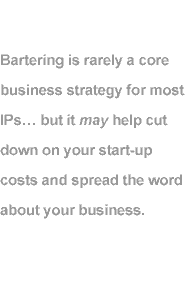 |
|
||||||||||||
 |
|
||||||||||||

|

|
|
By Gayle O'Brien
|
Do you love being an independent professional? Do you relish the freedom, the flexible hours, the four o'clock naps? Well, save it for your high school reunion -- being an IP is not a big boss-free vacation. The road to self-employment features some bumpy potholes and ugly-ass scenery. There's the quarterly taxation, the high start-up costs, and the occasional difficulty in getting stuff that W-2bies are served on silver trays. Now there ain't much you can do about the taxes, but there is a way for IPs to squeeze by the other pitfalls. What's the secret? Glad you asked. Bartering's the word. (Actually, Grease is the word -- but we're not talking about John Travolta movies here.) Service trading, or bartering for goods and services, is a common but under-publicized bonus to freelance life. UK Law Sally Hepburn of Sussex, England, was an employment lawyer before becoming a stay-at-home mom. After her daughter was born, she wanted to return to work part-time, but no firm would allow her to work from home on a regular basis. And then, one day... "A friend of a friend runs a day-care center, and one of the nannies was caught smoking on the premises," she recalls. "She was terminated, of course, but then tried suing the center for wrongful dismissal." As a favor, Hepburn wrote the legal letter for the center, and the ex-nanny dropped the case. "The center's manager was so grateful. They not only avoided taking the matter to court, which would have cost them more than they could afford at the time, but they saved the money a lawyer would have charged them to write the one-page letter." The manager offered Hepburn free day-care services in return. "It was an offer I couldn't refuse," Hepburn says. "The center is just down the road, so I could work from home but know that my daughter is close by and well cared for." The day-care center became a sort of marketing bazaar for Hepburn. "Pretty soon word got out that I had helped the center out, and when I'd go to pick up my daughter, I'd get all sorts of inquiries." She began helping people buy and sell houses, write wills, and negotiate divorces for other day-care parents. "One of the mothers is a masseuse and sadly was going through a divorce," says Hepburn. "She didn't have a lot of money, and asked if she could massage me in return for my negotiating her divorce." Hepburn has also bartered for haircuts, and got free letterhead stationery and envelopes from her local stationers: "I did all the legal work when they sold their house." Hepburn adds that the exchanges aren't always balanced: "Sometimes I know I'm not getting in return what I've given." She normally charges about £85 [$150] an hour for her services, and some barter equivalents work out better than others. "It definitely evened out with the masseuse: I was there once a week at least. But I've done more for the stationers than I'll ever need in business cards and envelopes -- though they've really helped spread the word about me, which is priceless." The day-care center continues to provide Hepburn with contacts and her daughter with supervision. It's a matter of balancing baby and business. A Little Bit of Bartering Most IPs don't barter for big-time necessities like childcare. In fact, much of the bartering that freelancers engage in is about exchanging small amounts of goods or services. For Jesse Milden, a Web and print designer based in New England -- Massachusetts, to be geographically correct -- most swaps were for friends who needed a hand. Milden has worked on his local cinema's Web page in exchange for free admission, has designed an invitation to an expensive dinner party in exchange for free tickets, and has done design work for a bar in Manhattan in exchange for free drinks. Unfortunately, says Milden, "I usually felt like the work I was doing was worth more than what I got in return." But these small projects were good additions to his portfolio, and he still swaps when such opportunities arise. Why might you want to do just a little bit of bartering? Well, it's a low-risk way for you to dip your toe into the trading pool. Or, like Milden, you might do it for social reasons. It's good for the soul, good for your image, and as Jesse Milden found out, good for livening up a Saturday night. Start Me Up Okay, you're hot to barter, but you don't know where to begin. What to do? Head straight for the ole information superduperhighway. In fact, the Internet is a virtual goldmine of bartering associations and resources. Organizations like the National Association of Trade Exchanges (NATE) and the International Reciprocal Trade Association (IRTA) are smart places to start. Trade exchanges provide a framework for bartering (and a good way to avoid the problems that Hepburn and Milden faced in getting equitable swaps). They monitor transactions, offer you a variety of bartering partners, and set ethical guidelines by which everyone will swap. Sounds perfect, right? Well, not exactly. For example, if you want to play, you have to pay -- and then pay some more. Usually you have to fork over a healthy membership fee (several hundred bucks) and then pay commissions (in cash) on your exchanges. These costs can add up. Also, some bartering exchanges are very poorly run -- so before you enlist with any group, do some investigation. Make sure your exchange has been approved by the Better Business Bureau or some other consumer protection organization, that it informs the IRS of its dealings, and that it offers the sorts of things you want and/or need. There are all kinds of exchanges out there, and if you get caught in a bad one, you'll look longingly back at the good old cash-only days. If you're not comfortable going through an exchange, start asking your freelance friends -- you never know who might be willing. Find a bartering bud, negotiate a fair exchange, and get swapping. |
|||||||||||||||||||||||
|
||||||||||||||||||||||||
|
June 12, 2000 Primary Editor: Ken Gordon Illustrator: Steve Smallwood Production: Fletcher Moore |
We'd love to hear your comments about this article! Gayle O'Brien is a freelance writer who lives in Borehamwood, England. If you like, we'd be happy to put you in touch with her, or with any of the other IPs named in this article. |
|||||||||||||||||||||||
|
|
||||||||||||||||||||||||